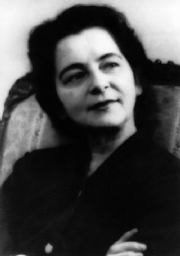Grazyna Bacewicz
Bacewicz was born in Lódz on February 5, 1909 to parents Maria and Vincas (Wicenty) Bacewicz. Her father, having been from Lithuania, instilled a deep connection to their Lithuanian heritage, despite changing his name from the Lithuanian Bacevicius to Bacewicz. He also was her first music teacher, and insisted all four of their children study violin, piano, and fundamental music theory from a young age.
Grazyna was the third of four children, with two older brothers, Kiejstut and Vytuatas, and one younger sister, Wanda. Vytautas identified as Lithuanian, using his father's original last name (Bacevicius), and also became an accomplished pianist and composer. Grazyna performed her first concert at the age of seven, alongside her brothers, and she wrote her first piece at around thirteen years old.
In 1928, she began studying at the Warsaw Conservatory, where she studied violin with Józef Jarzebski and composition with Kazimierz Sikorski; she also studied piano with Józef Turczynski for two semesters. After graduating in 1932, she attended composition classes led by Nadia Boulanger at the École Normale de Musique. During this time, she continued to play violin, and studied with André Touret and Carl Flesch.
After completing her studies, Bacewicz continued her musical career as both a composer and performer, appearing as a soloist and acting as a jury member for competitions. She served as the concertmaster of the Polish National Radio Symphony Orchestra, directed by Grzegorz Fitelberg from 1936-1938. During this time, the orchestra performed her first violin concerto, as well as her Three Songs for tenor and orchestra. She married her husband, physician and medical professor Adrzej Biernacki, in 1936, and the couple had a daughter, Alina Biernacka, in 1942.
During World War II, Bacewicz moved to Warsaw, where she continued to compose and perform in secretive underground concerts, which is where she premiered her Suite for Two Violins. Following the Warsaw uprising, Bacewicz and her family escaped the destroyed city and temporarily settled in Lublin.
After the war, she took up a position as a professor at the State Conservatoire of Music in Lódz. “Bacewicz’s reputation grew during the post-war era, despite the general censorship resulting from political realisation of socialist cultural reforms”. Despite the ideological control of arts, Bacewicz continued composing from 1945 to 1955, even though it was difficult to perform many of them. With her rising recognition, as well as growing number of awards and commissions, she began to shift her focus towards composition. In 1954, she was involved in a car accident, causing her family minor injuries, but breaking Bacewicz's pelvis and some of her ribs, hospitalizing her for an extended period. This forced her to consider composition as her only occupation, as she was no longer able to perform.
In 1956, the first Warsaw Autumn Festival featured three of her compositions, and at each of the Autumn Festivals in subsequent years, her music became a signature of the events. Her output became prolific during this time, and was widely acclaimed. She continued to compose until her death in 1969 in Warsaw.














 My Wish List
My Wish List













